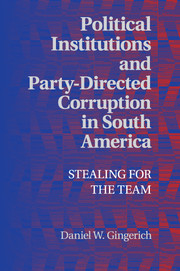Book contents
- Frontmatter
- Contents
- Preface
- Acknowledgments
- 1 Institutions and Political Corruption: A Framework
- 2 Institutional Design and the Case for Mechanism-Based Analysis
- 3 Ballot Structure, Political Corruption, and the Performance of Proportional Representation
- 4 An Approach to Overcoming the Fundamental Problem of Inference in Corruption Studies
- 5 Political Career Paths in the Bureaucracy and the Use of Institutional Resources in Bolivia, Brazil, and Chile
- 6 Conclusion
- Bibliography
- Index
- Miscellaneous Endmatter
3 - Ballot Structure, Political Corruption, and the Performance of Proportional Representation
Published online by Cambridge University Press: 18 December 2013
- Frontmatter
- Contents
- Preface
- Acknowledgments
- 1 Institutions and Political Corruption: A Framework
- 2 Institutional Design and the Case for Mechanism-Based Analysis
- 3 Ballot Structure, Political Corruption, and the Performance of Proportional Representation
- 4 An Approach to Overcoming the Fundamental Problem of Inference in Corruption Studies
- 5 Political Career Paths in the Bureaucracy and the Use of Institutional Resources in Bolivia, Brazil, and Chile
- 6 Conclusion
- Bibliography
- Index
- Miscellaneous Endmatter
Summary
The Puzzle
In early May 2005, the Brazilian newsweekly Veja acquired a two-hour-long video (shot from a hidden camera) that showed Maurício Marinho, then head of procurement for the National Postal Service of Brazil (Correios), receiving a bribe in exchange for granting a contract. The amount changing hands in the transaction was in and of itself unremarkable. Yet the tape was exceptional in that it provided a rare glimpse of the inner workings of a particular type of abuse of state power: party-directed corruption schemes within the public bureaucracy.
Over the course of the tape, Marinho explained in detail how his payoff was a component of an extensive party-directed corruption network orchestrated for the benefit of his party (PTB) by its then president, Roberto Jefferson. He described how he was one of a number public employees placed in strategic positions within the institution by the PTB, each of whom understood that his primary responsibility was to use his power over the public purse to generate electoral resources for the party. In Marinho's words, “Everything that is done here is shared with the president, with the party …. The PTB gives me cover, he [Jefferson] gives me cover …. I don't do anything without consulting first” (quoted in Veja, May 18, 2005, pp. 54–61, author's translation).
- Type
- Chapter
- Information
- Political Institutions and Party-Directed Corruption in South AmericaStealing for the Team, pp. 66 - 116Publisher: Cambridge University PressPrint publication year: 2013

